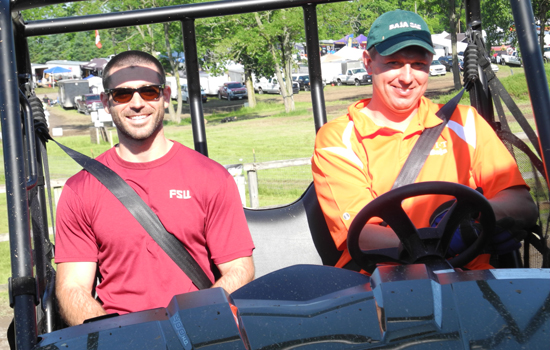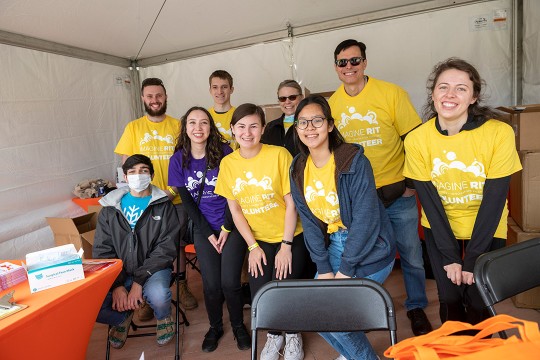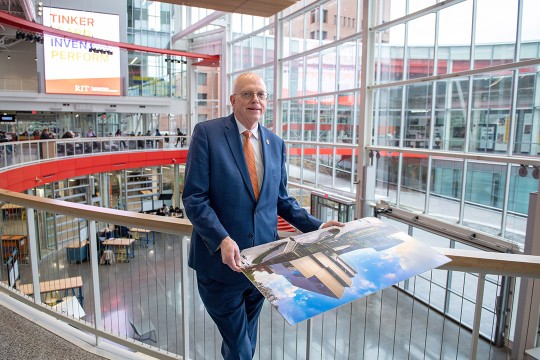CAST grad drives Baja collegiate competition
Jason Rounds ’00, right, and Cody Whelan, former SAE risk management specialist, checked out the course before the 2013 Baja Rochester World Challenge endurance race. Rounds is technical and safety lead for Baja collegiate competitions throughout the country.
It’s been almost 15 years since Jason Rounds ’00 (mechanical engineering technology) hurtled over hills and rocks in an RIT Baja car. He hasn’t forgotten the thrill of the ride as a competitor or of leading one of the most successful Baja collegiate race teams in the country. Today he remains involved, but as the technical lead for the Society of Automotive Engineers Baja off-road collegiate racing competitions.
As an undergraduate, Rounds saw firsthand how competitions are run across the country. Most were well-coordinated efforts, but he noticed some inconsistencies in how rules for the important technical and safety inspections were interpreted from event to event. When he approached SAE after graduation with a plan to standardize inspections, it would be a commitment to the sport he enjoyed. It also became a structured, accepted process that remains in place for all events today.
“When I left school, I knew I was staying active in Baja. I made sure every company I interviewed with knew I was active. I said this is what I do. I’m not using my vacation. I want this to be a part of the culture, and I’ve been able to sell it every time,” said Rounds, who is a maintenance and modification engineering manager for TTX Company, an international rail and freight management organization in Chicago.
That first year, SAE supported a small group of technical advisers. Many were Baja alumni like Rounds, who traveled together to events around the country. It wasn’t always easy. They were the new guys, the outsiders, he recalled. But part of the Baja philosophy is overcoming obstacles, whether they are fixed ideas or damaged gear shafts.
“That’s the point of engineering, to fix the failure, and if you can’t react quicker than the other guy and work under pressure, then you won’t be successful,” he said.
SAE sponsors three main Baja races each season and several international events. Teams opt in to one or more of the off-road competitions. Many are held on university campuses then move to nearby motocross fields for races up and over steep hills, through wooded areas, on muddy trails and around hairpin curves.
Rounds and his inspectors scrutinize race car systems, infrastructure, equipment and drivers’ awareness of safety measures before teams take the field. An OK from the technical inspectors means Baja cars are ready to race. Without an OK, teams watch from the stands.
“We’ve grown the group to 25 people. I have technical leads for cost and scoring and I lead the tech area, but I also help to manage the group’s travel. I’ve been doing more consulting in the last few years to train people for new events in the future.”
Succession planning is high on Rounds’ mind as he continues in his role. He is looking for that person who lives and breathes Baja to take his place eventually.
“My goal in the next five years is to get a new group organizing and running races, at new venues, some new blood. I have no plans to leave in the short term, but I know I’m not going to be 70 and still doing Baja,” he said, laughing.
If you go
RIT will host the SAE Baja World Challenge at the university’s Gordon Field House and Activities Center and Hogback Hill Motocross Speedway in Palmyra, N.Y., June 9-12. This is the sixth time RIT has hosted the international event and expects 100 collegiate teams from the U.S., Canada, India, Brazil, Venezuela and Mexico.















